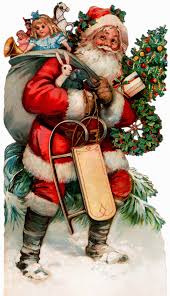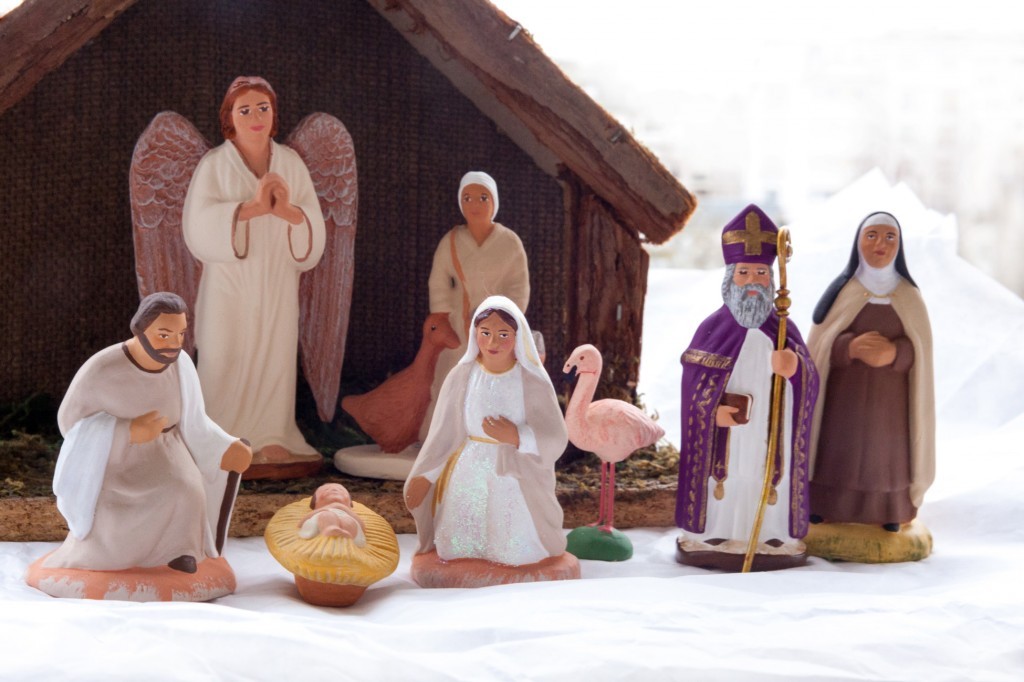We’ve spent many a Christmas here, but this French holiday vocabulary had us stumped.
Here are 5 linguistic tips so you wont’ be!
Agapes
Holiday tables in France are laden with goodies like oysters, foie gras, cheese in all shapes and sizes, fresh-baked bread, spice cookies and of course, champagne. Shared with family and friends, they are collectively known as agapes (pronounced “ah-gap”). The word comes from the Greek agape, meaning both God’s love for man and brotherly love for one’s neighbor.
 Hotte
Hotte
Children around the world look forward to the holidays for the presents they hope to receive. Depending on the country, those gifts come from Santa Claus, Père Noël in France, the benevolent witch La Befana in Italy, or the three Wise Men in Spain. French children place their shoes (not stockings) near the Christmas tree in hopes of Santa’s largesse. He comes bearing presents in his hotte (pronounced “ot”), or large sack. No matter how big the bag or good the goodies in it, it isn’t an hotte unless its owner is Père Noël himself.
Santon

Many Christmases ago, I landed my first (and last) theater gig as a sheep in my school’s annual Christmas play. The coveted roles of Mary, Joseph or one of the Wise Men were off limits, so I was hoping for at least the wings and halo of an angel. Alas, I had to settle for a fluffy white costume leaving only my pink face peeping out. (see photo below.) Along with my fellow kindergartners, I mutely followed a fifth-grader carrying a staff around the stage. It wouldn’t have been much consolation to know it then, but we were unwittingly participating in an 800-year-old tradition: that of the live crèche, started by Saint Francis of Assisi in 1223. Today, despite France’s increasingly secular society, nativity scenes still abound this time of year, but the figures are no longer flesh and blood. Made from just about anything— wood, ceramic, glass or plastic—the figures have a special name: santons. The word is undoubtedly related to the word for “saint.” Yes, that includes even the humble sheep.
Etrennes
Pronounced “ay-tren,” this is the tip you give during the holidays to doormen, concierges, mailmen, or anyone else who provided services throughout the year. Similar to the Boxing Day tradition in commonwealth countries (a reference to the boxes of goodies people used to give to the postman) étrennes, in the form of a monetary tip, are offered in France on or around January 1. Its etymology is still debated by linguists, but it may come from a little-known ancient Roman goddess, Strena. She had a sacred grove where people would cut sprigs of medicinal plants to offer each other as a sign of health, happiness and prosperity throughout the year.
Au gui l’an neuf

We owe this admittedly obsolete phrase (meaning something akin to “Happy New Year”) to France’s favorite Druids, Asterix and Obelix. The dynamic duo of comic strip fame is to French kids what Micky and Minnie are to their American counterparts. We don’t recommend you go around uttering this phrase today, as the Druids did when cutting down sacred plants in the forest. But there is one word worth remembering: gui. Pronounced “ghee,” it’s French for mistletoe. The parasitic plant was used by Asterix to make magic potions, giving Obelix his impressive heft and heroic strength. Celtic legend has it that soldiers who passed beneath the plant, which grows in clusters high up in trees, had to lay down their arms and abstain from combat for the remainder of the day. This very well could be the origin of the holiday tradition of kissing beneath the mistletoe.
From all of us here at Paris Muse, Joyeuses Fêtes !






